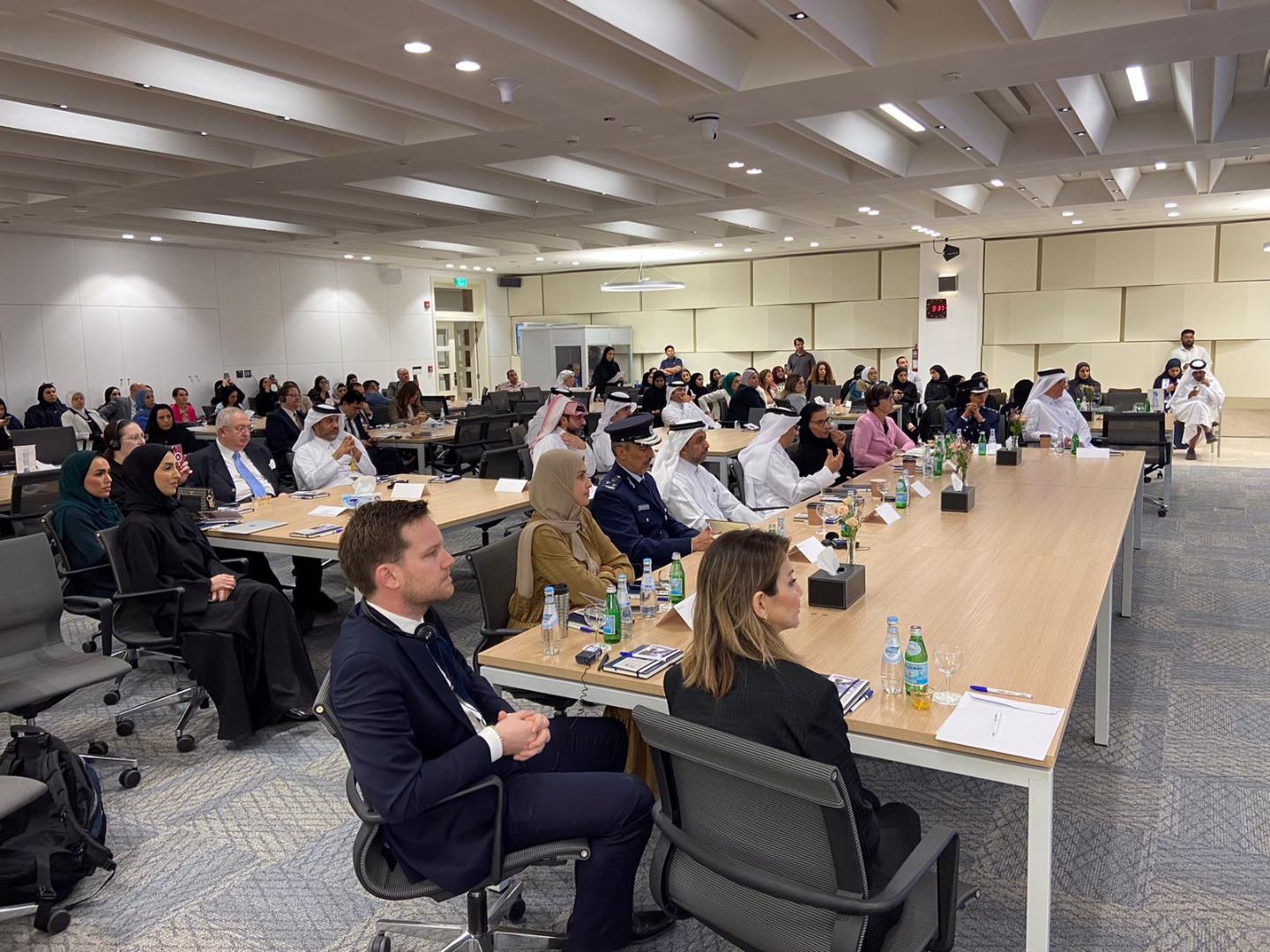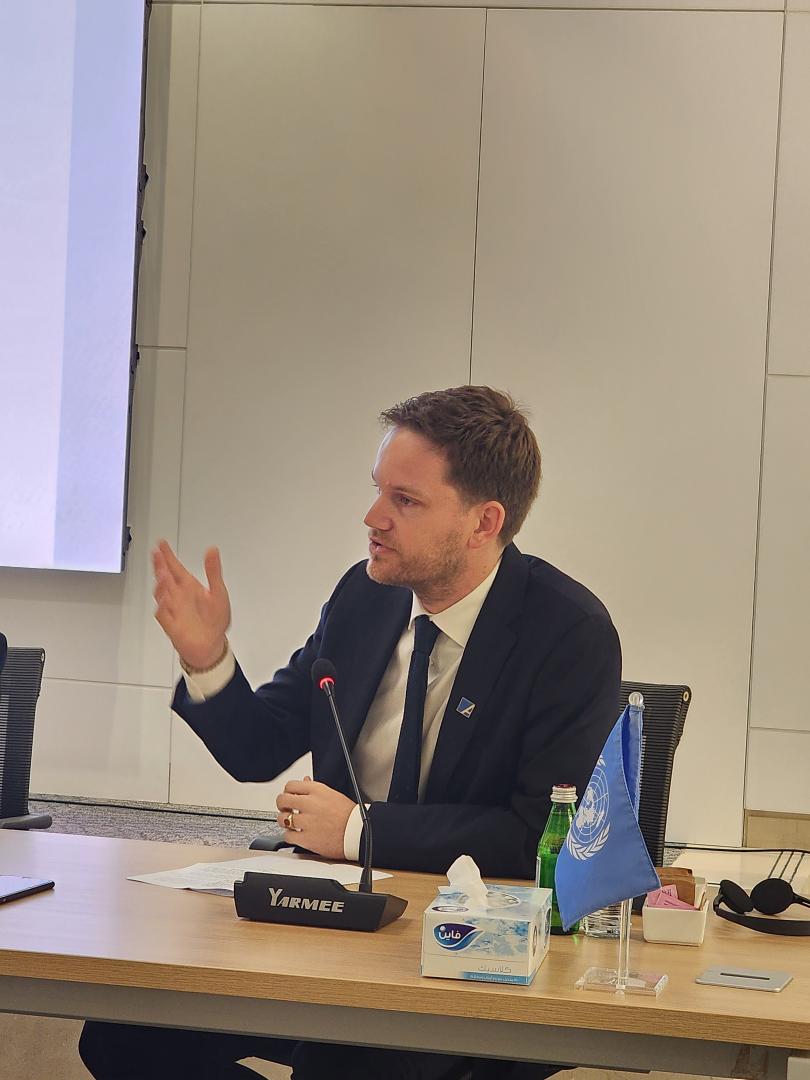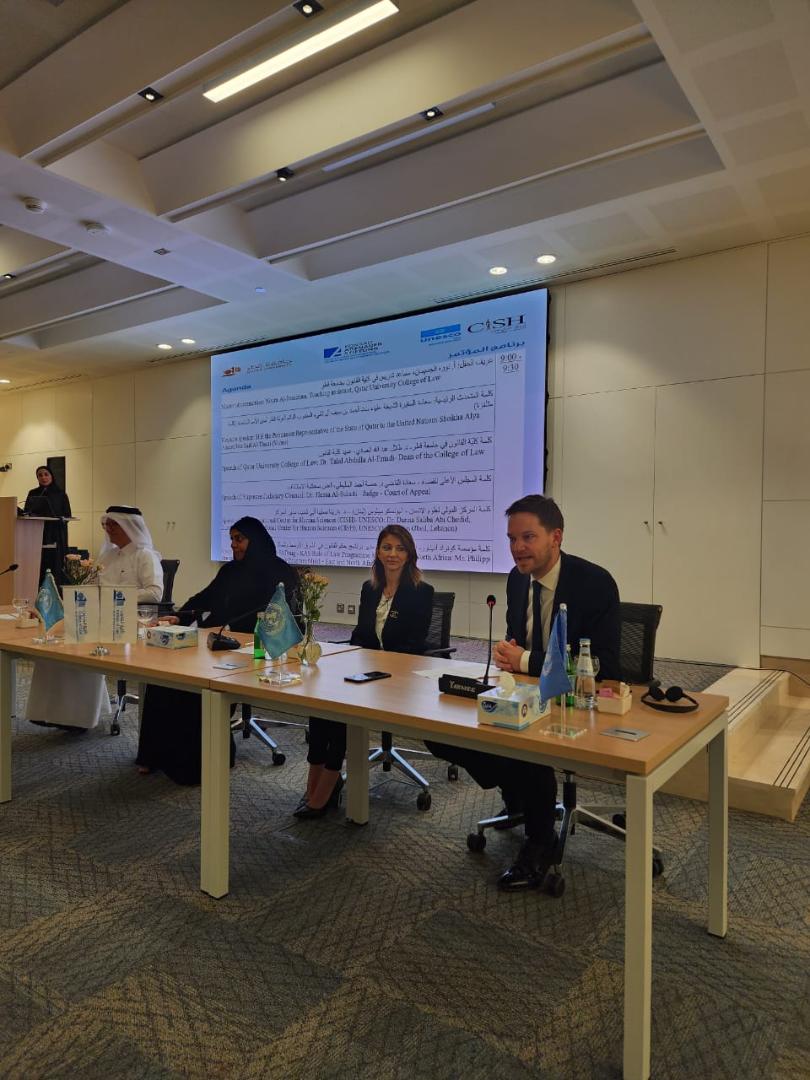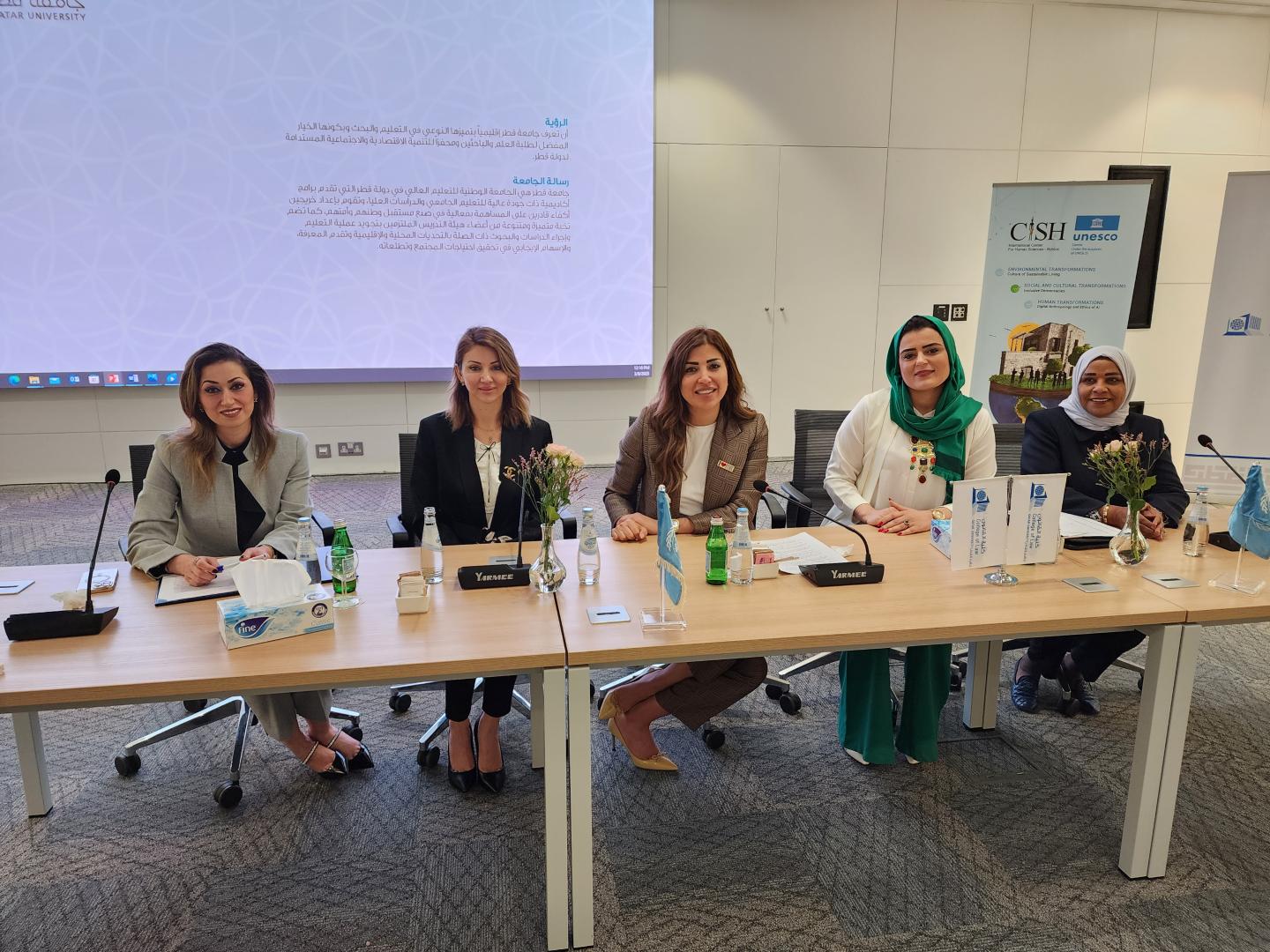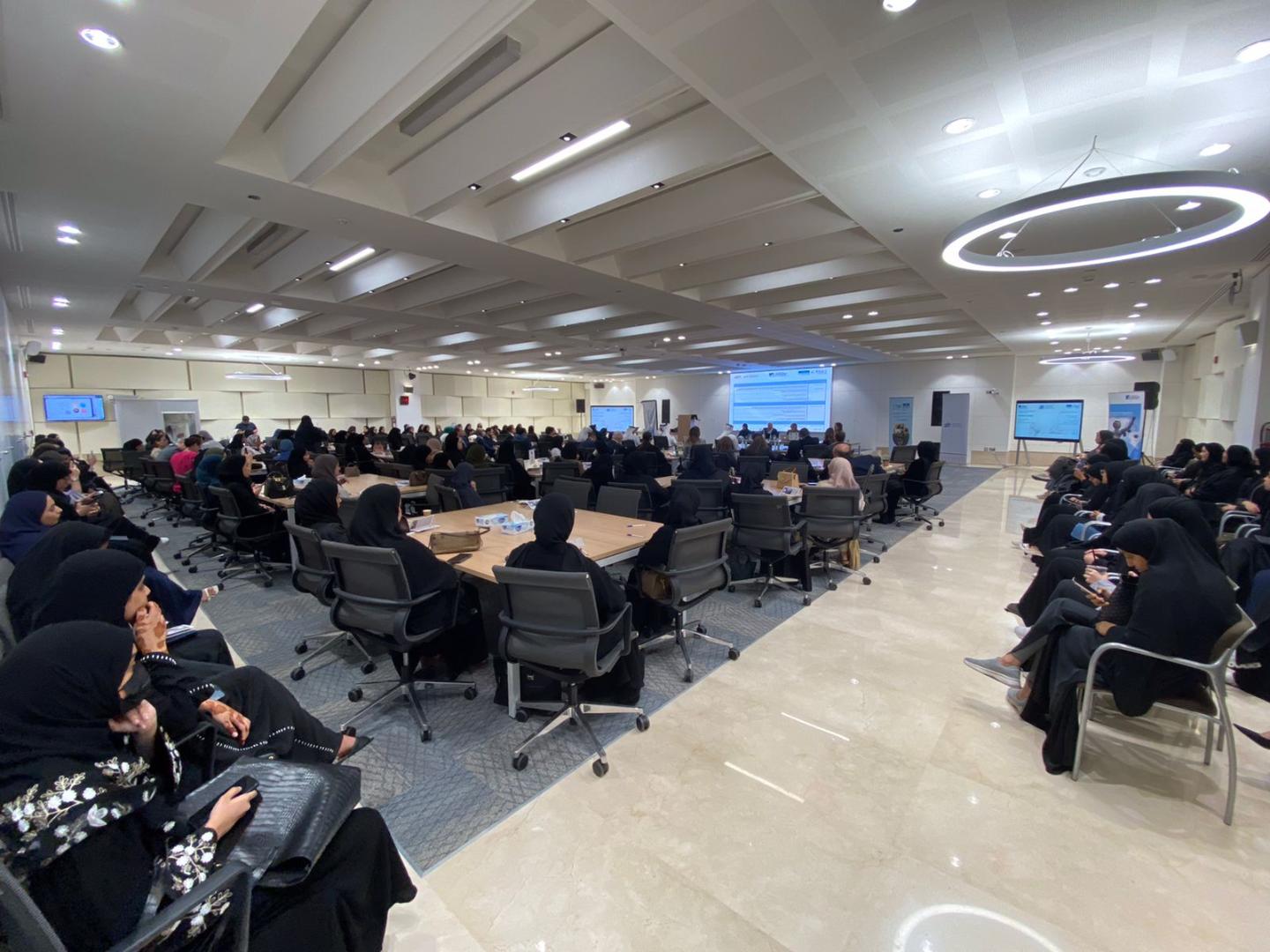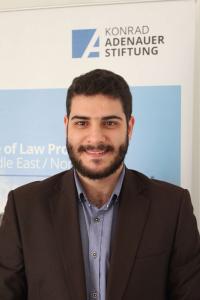The event started with welcoming remarks from H.E the Permanent Representative of the State of Qatar to the United Nations Sheikha Alya Ahmed bin Saif Al-Thani (via a recorded speech). Her excellency mentioned that 2010 was the year were the State of Qatar had its first female judge. Saying that, she praised the efforts made by the State of Qatar in order to reach a 30% of female judges by the year 2030.
Next, the speech of the hosting institution, the Qatar University College of Law, held by Dr. Talal Abdulla Al-Emadi, the dean of the College of Law, who raised the importance of local, regional and international cooperation in regard to gender base equality.
Afterwards, Dr. Darina Saliba Abi Chedid, Director of CISH - UNESCO, Byblos took the stage. Dr. Chedid underlined the importance of having female judges in our Arab judiciaries. She reflected on the fact that Justice itself is represented by a blindfolded lady.
The last opening remark was held by Mr. Philipp Bremer, Director of the KAS Rule of Law Programme Middle East and North Africa. Mr. Bremer stated that from a perspective of equality, there is a room for improvement in the region and that “women can judge as competently and informatively as men”. He added that “the more women are involved in the judiciary as judges, the more equality and social justice we will have – and representative jurisprudence too”.
This event hosted female judges from 5 different Arab countries, namely: Lebanon, Jordan, Kuwait, Tunisia and Qatar. We had 200+ attendees, including lecturers, experts and mainly female law students. This regional conference was divided into 3 sessions, having each a specific thematic. They were as following:
***
The First Session: The Role of Women in the judiciary: The Qatari experience.
Speakers:
Judge Hessa Al-Sulaiti - Judge at the Court of Appeal in Doha, Qatar.
Judge Alreem Al-Naimi - Judge at the First Instance Court in Doha, Qatar.
Judge Mariam Al-Hdefi - Judge at the First Instance Court in Qatar.
Moderated by:
Judge Aisha Hassan Al-Emadi - Head of First Instance Court in Doha, Qatar.
In this session, the Qatari female judges gave their personal feedback: they mentioned that being a judge is an ongoing work that needs a lot of time but at the same time, being a judge is a noble mission. Concerning the challenges, they are facing, they reported two kind of challenges; the ones who are inherent to the judiciary itself and the social-cultural ones. As for the first part, usually cases were handed equally to all judges if they were man or woman. None of them faced any kind of discrimination based on their gender, at the contrary, their male colleagues alongside their superior helped them a lot to integrate and to feel at ease and welcomed. However, concerning the second type of challenges, indeed a cultural resistance can be felt - women being perceived as not fit or suited for this job. This said, the judges highlighted the crucial role that media has to play. Media can promote further women judges. It can be a tool to make woman judges a role model for young ladies. In addition, it was mentioned that a woman is capable of being a judge and that competence is the only difference between a man and a woman.
The Second Session: The Role of Women in the judiciary and promotion of integrity and justice in the Arab countries.
Speakers:
Judge Dr. Souhair Taboussi - Head of the seventh human rights comission at the Amman Court of Appeal, Jordan
Judge Amani Salameh - First Investigating Judge, commissioned in the Bekaa, Lebanon
Judge Rana Akoum - Head of the Implementation Department in Jdeideh El Metn, Lebanon
Moderated by:
Dr. Muna Al-Marzouqi - Associate Vice President for Academic Planning & Quality Assurance in Qatar University.
This second session started by the following sentence: “we cannot accept to say that having women in the judiciary is a luxe”. Later on, the Jordanian and Lebanese judges gave their personal experience on how being a woman can make the difference. To this endeavor, we can say that Jordan is a country that is more open than other Arab countries. In its turn, Lebanon is a country were more than half the judges are women - based on the last studies 52% of the judges are women. At the end, it was mentioned that: laws are “passive texts”. Thus, judges should not be nor become machines - they are invited to use their own instincts.
The Third Session: Strategies for Improving Women's Participation in the judiciary.
Speakers:
Judge Imen Maaouia - Judge in charge of planning and programming in the office of the Tunisian Minister of Justice, Tunisia
Judge Nazik Al-Khatib - Attorney General at the Public Prosecution Office in Mount Lebanon, Lebanon
Dr. Suad Altarawrah - Law adviser at the Amiri Diwan in the office of His Highness, Kuwait
Dr. Darina Saliba Abi Chedid - Director of the International Center for Human Sciences (CISH), UNESCO in Byblos, Lebanon
Moderated by:
Dr. Faten Hawa - Professor of Commercial Law at the Qatar University College of Law
As for this third and last session, a call to a more open religious interpretation was raised. Moreover, there is a need to enforce and strengthen the national procedures and policies related to women rights, if they were governmental or social. The Tunisian example was tackled also; the judiciary in Tunisia is approximately gender balanced. Towards the end of the workshop, two main points were raised: 1)- the political will is the corner stone for the change, and 2)- the respect of international treaties and conventions such as ICCPR and CEDAW is of an utmost importance.
At this stage, this regional conference ended. An e-publication will be available online soon.



